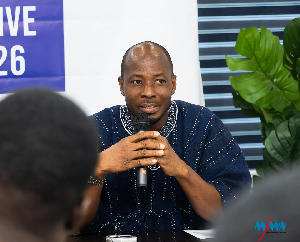Accra, Oct. 8, GNA - The International Cyanide Management Institute (ICMI) in collaboration with Ghana Chamber of Mines (GCM) on Thursday organised a workshop to build the capacity of stakeholders in the gold mining industry. The workshop, which was the second to be co-organised by the ICMI and GCM in West Africa since 2007, also exposed the participants to effectively reduce risks and impact of cyanide related emergencies in Accra.
The event also enabled the participants mainly from 65 countries representing mining and mining support companies, to voluntarily sign on to the International Cyanide Management Code. The Code for the manufacture, transport and use of cyanide in the production of gold, is a voluntary industry programme for the gold mining industry, to promote responsible management of cyanide use in gold mining.
It is aimed at enhancing the protection of human health, and reduce the potential for negative environmental impacts. Mr Jurgen Eijgendaal, President of GCM, in an address read on his behalf, said environmental management was a key corporate priority, adding that there was the need for the subject to be integrated into the mining operations of companies.
He said even though the code was a voluntary programme for gold mining as well as producers and transporters of cyanide, its compliance could ensure a safer and more improved management of the chemical to ensure the safety of workers, communities and the environment. Mr Eijgendaal disclosed that four gold mining companies that were members of GCM had so far signed on to the code. They are Newmont Ahafo mine, Anglogold Ashanti, Gold Star mines and Gold Fields.
Ms Joyce Aryee, Chief Executive Officer of GCM, said though the code was voluntary, its adoption and strict compliance would enhance good corporate image and engender goodwill. "Remember that being a responsible company has far reaching consequences. It has consequences for your reputation and your ability to source funds from donors," she said. She said any company that had best environmental and social practices, was seen by the corporate world as responsible, adding that such a company had many organisations and institutions purchasing their shares.
Ms Aryee appealed to other gold mining companies in the country that had not yet signed on to the code to do so and conform to an internationally acceptable best practise of cyanide management. Mr Norm Greenwald, Vice President and Secretary of ICMI, told the Ghana News Agency, that the code was produced and completed in 2002 after a cyanide spillage destroyed aquatic life in Romania in 2000. He said the spillage was so destructive that the United Nations and the International Mining Group organised a workshop to develop a code which would serve as an international standard of proper management of cyanide.
Mr Greenwald explained that companies that signed on to the code must have their operations audited by an independent third party to demonstrate their compliance.
He said audit results would be made public as part of the measures to inform stakeholders of the status of cyanide management practices at certified operations.
Mr Greenwald said the code focused exclusively on the safe management of cyanide and transportation for the recovery of gold and the requirements that related to financial assurance, accident prevention, emergency response, training, public reporting, stakeholder involvement and verification procedures.
He said "the code will not serve as a guarantee that the world would be safe but it can guarantee that companies that comply strictly with the code would reduce risks and negative impact of cyanide spillage in the environment."
Mr Greenwald said gold mining companies with either single or multiple operations, and the producers and transporters of cyanide used in gold mining could become signatories to it.
"By becoming a signatory, a company commits to follow the Code's Principles and implement its Standards of Practice, or in the case of producers and transporters, the Principles and Practices identified in their respective Verification Protocols. Code signatories' operations will be audited to verify their operation's compliance with the Code," he said.
Mr Greenwald emphasised that the code was intended to complement an operation's existing regulatory requirements and not to contravene rules and laws of an applicable political jurisdiction of a country that adopted the code.
Cyanide is a potentially dangerous chemical that contains carbon and hydrogen chemical elements, as well as salts and complexes of cyanide with a variety of metals in solids and solutions. The ICMI is a non-profit corporation established to administer the code through a multi-stakeholder Board of Directors, consisting of representatives of the gold mining industry and participants from other stakeholder groups. 8 Oct. 09
General News of Thursday, 8 October 2009
Source: GNA












